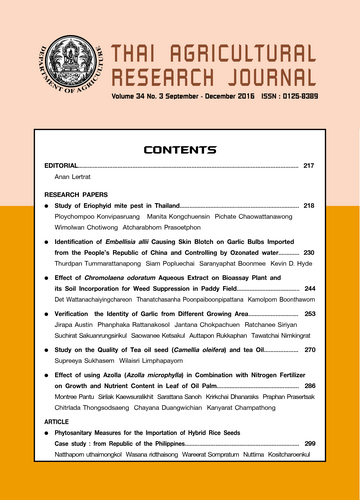Phytosanitary Measures for the Importation of Hybrid Rice Seeds Case study : from Republic of the Philippines
DOI:
https://doi.org/10.14456/thaidoa-agres.2016.17Keywords:
phytosanitary measures, hybrid rice seeds, rice seeds, Republic of the PhilippinesAbstract
Importation of Hybrid rice seed from Republic of the Philippines is necessary to conduct research on pest risk analysis to know for quarantine pest of concern and to determine appropriate phytosanitary measures to manage quarantine pests that may be attached to the hybrid rice seeds imported. The case study, the amount of 1,722 seeds sample were testing in laboratory, no quarantine pests were found and 913 species of pest associated with rice. The seven species of pest are potential to be quarantine pest. The
result from the assessment of probability of introduction, spread and economic consequences found Trogoderma granarium, Gibberella zeae and Burkholderia glumae are high risk, Balansia oryzae-sativae, Pseudomonas fuscovaginae, Aphelenchoides besseyi and Lolium temulentum are medium risk. Phytosanitary measures are necessary to reduce risk.
All quarantine pest require pest management before imported into Thailand such as 1) The rice seed produced from pest free area or pest free production site of Balansia oryzaesativae, Gibberella zeae, Burkholderia glumae, Pseudomonas fuscovaginae and Aphelenchoides besseyi and Lolium temulentum and found free from Trogoderma granarium or 2) the rice seeds were derived from mother plants that were inspected during growing
Downloads
Published
How to Cite
Issue
Section
License
Copyright (c) 2017 วารสารวิชาการเกษตร (Thai Agricultural Research Journal)

This work is licensed under a Creative Commons Attribution-NonCommercial-NoDerivatives 4.0 International License.
Thai Agricultural Research Journal



